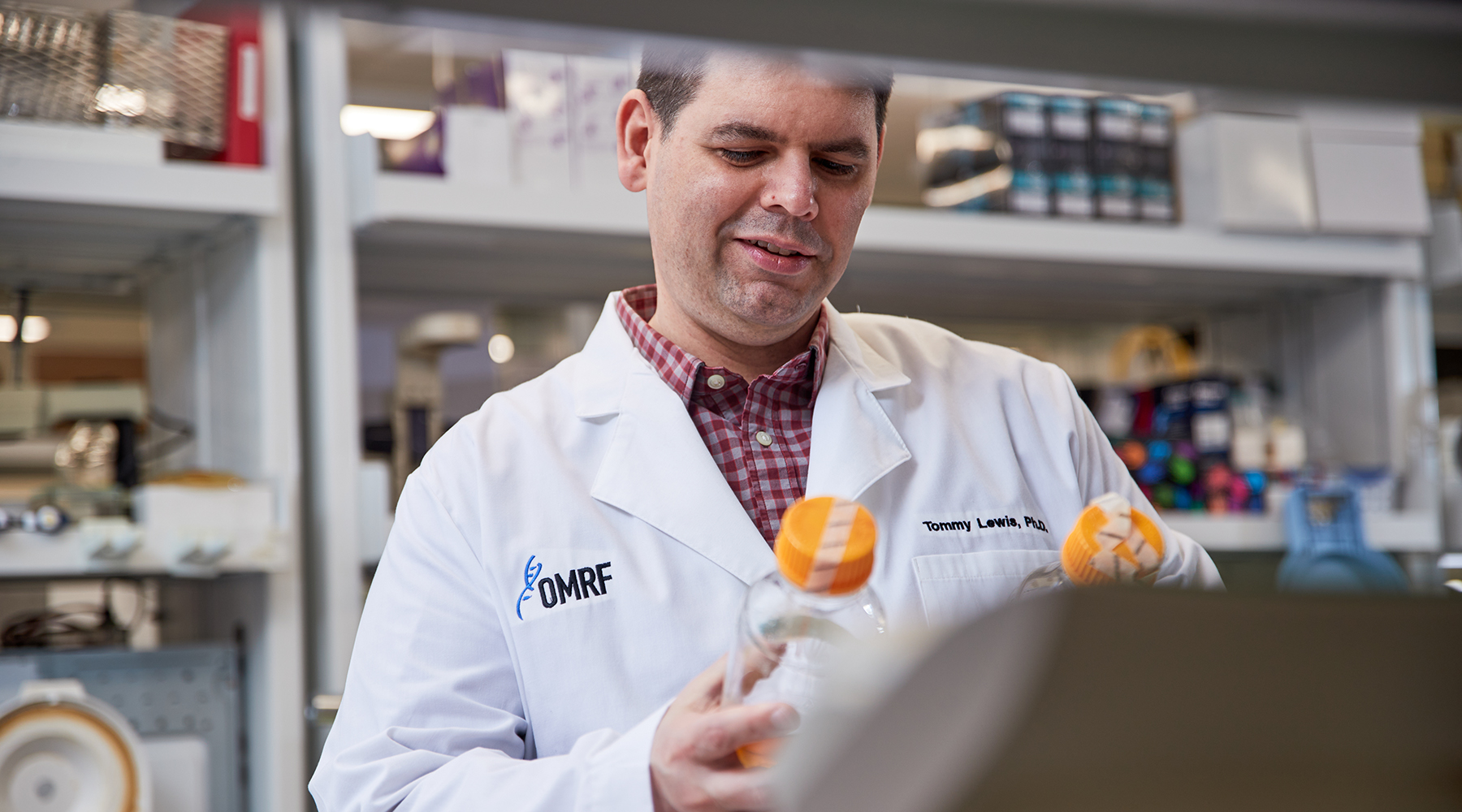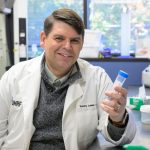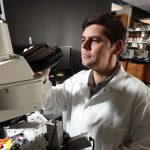Tommy Lewis, Jr., Ph.D.
Assistant Professor
Aging & Metabolism Research Program
My 101
Mitochondria are often referred to as the “powerhouse of the cell.” However, for something important enough to gain that kind of reputation, we still have much to learn about the various roles mitochondria play in humans.
My lab focuses on the function of mitochondria in neurons during both health and disease. We are interested in learning how neurons control our brain, and what goes wrong during aging leading to devastating neurodegenerative conditions like Alzheimer’s, dementia and Parkinson’s.
Traditionally, we have to look at these cells outside the body in a dish but many times it is difficult to translate that work back into something relevant for treating human patients.
We have developed a new imaging method where we can observe the function of mitochondria in living, relevant mouse models. As this research develops, we will be able to track what happens during disease progression in real-time. This may result in new avenues for understanding these traumatic diseases.
Research
One of the most striking features of neurons is the extraordinary structural and functional compartmentalization of their somatodendritic and axonal domains. They use this high degree of polarization to receive electrical and chemical information from many other neurons, integrate it, and then transmit this information to their synaptic partners. Recent work has revealed that the specific localization of mitochondria is required for both axonal and dendritic development and maintenance.
Many studies claim that reduced mitochondrial motility is a main player in multiple neurodegenerative diseases; yet, most of these studies were performed using immature cultured neurons. This is surprising as the highly stratified patterns of axon and dendrite branching found in vivo cannot be recapitulated in the widely used in vitro dissociated culture systems, and these cultured neurons are grown in 5 times the level of glucose normal for vertebrates. Based on our and others recent results, we now know that mitochondrial motility is actually extremely low in healthy, mature adult axons and dendrites in vivo. This suggests the need for a complete re-evaluation of the role of mitochondria trafficking in neurodegenerative disease progression, and therefore it is imperative we begin to develop tools and methods to study these processes in vivo.
Our work focuses on two main questions:
- What are the cellular and molecular mechanisms that regulate compartmentalized morphology and function of mitochondria in neurons?
- How are these mechanisms altered during the early stages of neurodegeneration, and how does this contribute to reduced neuronal function and degeneration?
These questions are probed using a suite of genetic, cellular and molecular tools including in vivo 2-photon imaging, in utero electroporation, viral transduction and proteomics.
Our longterm goal is to understand the physiological role of mitochondria in neuronal function and disease, and to identify novel therapeutic targets for the treatment of these diseases.
Brief CV
Education
B.S., University of Southern California, Los Angeles, 2003
Ph.D., University of Southern California, Los Angeles, 2010
Postdoctoral training, Columbia University, New York, 2013-2018
Postdoctoral Training, The Scripps Research Institute, La Jolla, CA, 2010-2013
Honors & Awards
2012 F32 NRSA Postdoctoral Fellowship, National Institute of Neurological Disorders and Stroke
2015 K99/R00 Pathway to Independence Award, National Institute of Neurological Disorders and Stroke
Joined OMRF’s scientific staff in 2018
Publications
Recent Publications
Strucinska K, Kneis P, Pennington T, Cizio K, Szybowska P, Morgan A, Weertman J, Lewis TL Jr. A role for Fis1 in dendritic development. Sci Rep, 2025 December, PMID: 41436568
Sok SPM, Cheng J, Strucinska K, Popescu NI, Wu L, Ke Q, Kiosses WB, Stanford D, Freeman WM, Matsuzaki S, Lewis TL Jr, Zhao M. P-glycoprotein expression skews mitochondrial dye measurements in T cells. Front Immunol 16:1560104, 2025 June, PMID: 40607427, PMCID: PMC12213397
O'Reilly CL, Davidyan A, Cizio K, Doidge SM, Bubak MP, Borowik AK, Lewis TL Jr, Miller BF. Combining In Vivo 2-Photon Imaging with Photoactivatable Fluorescent Labeling Shows Low Rates of Mitochondrial Dynamics in Skeletal Muscle. Med Sci Sports Exerc, 2025 May, PMID: 40310022, PMCID: PMC12323594
Selected Publications
Zehnder T, Petrelli F, Romanos J, Ee Oliveira Figueiredo EC, Lewis TL Jr, Déglon N, Polleux F, Santello M, Bezzi P. Mitochondrial biogenesis in developing astrocytes regulates astrocyte maturation and synapse formation. Cell Rep. 2021 Apr 13;35(2):108952. doi:10.1016/j.celrep.2021.108952. PMID: 33852851
Rangaraju V*, Lewis TL Jr*, Hirabayashi Y*, Bergami M*, Motori E*, Cartoni R*, Kwon SK*, Courchet J*. Pleiotropic mitochondria: The influence of mitochondria on neuronal development and disease. J Neurosci. 2019 Oct 16;39(42):8200-8208. doi:10.1523/JNEUROSCI.1157-19.2019. PMID: 31619488, PMCID: PMC6794931
Lewis TL Jr*, Kwon SK*, Lee A, Shaw R, Polleux F. MFF-dependent mitochondrial fission regulates presynaptic release and axon branching by limiting axonal mitochondria size. Nat Commun. 2018 Nov 27;9(1):5008. doi:10.1038/s41467-018-07416-2/ PMID: 30479337, PMCID: PMC6258764 *Co-first authors
Lewis TL Jr, Turi GF, Kwon SK, Losonczy A, Polleux F. Progressive Decrease of Mitochondrial Motility during Maturation of Cortical Axons In Vitro and In Vivo. Curr Biol. 2016 Oct 10;26(19):2602-2608. Epub 2016 Sep 15. PMID: 27641765 PMCID: PMC5235338
Toyama EQ, Herzig S, Courchet J, Lewis TL Jr, Losón OC, Hellberg K, Young NP, Chen H, Polleux F, Chan DC, Shaw RJ. AMP-activated protein kinase mediates mitochondrial fission in response to energy stress. Science. 2016 Jan 15;351(6270):275-281. PMID: 26816379 PMCID: PMC4852862
Contact
Aging & Metabolism Research Program, MS 46
Oklahoma Medical Research Foundation
825 N.E. 13th Street
Oklahoma City, OK 73104
Phone: (405) 271-7582
Fax: (405) 271-1437
E-mail: tommy-lewis@omrf.org
For media inquiries, please contact OMRF’s Office of Public Affairs at news@omrf.org.
Lab Staff
Katarzyna Cizio
Graduate Student
Parker Kneis
Graduate Student
Abigail "Abbi" Morgan
Graduate Student
Travis Pennington
Graduate Student
Jeannie Evans
Project Coordinator II








